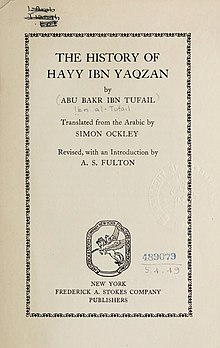哈义·本·叶格赞的故事
《哈义·本·叶格赞的故事》(阿拉伯语:حي بن يقظان Ḥayy ibn Yaqẓān),阿拉伯文哲学寓言小说,作者是12世纪阿拉伯穆斯林博学家伊本·图费勒[1]。其拉丁文译本名为《自修的哲学家》(拉丁语:Philosophus Autodidactus)。哈义·本·叶格赞这一名字是小说的主人公,取自伊本·西那的著作[2][3]。小说讲述了一个无人岛上的野孩子在瞪羚抚养下,通过自主学习逐步悟出哲学真理的故事。小说极大地影响了伊斯兰哲学乃至启蒙时代哲学的发展[4]。
| 哈义·本·叶格赞的故事 | |
|---|---|
 1708年英译本扉页 | |
| 原名 | حي بن يقظان |
| 作者 | 伊本·图费勒 |
| 类型 | 哲学 |
| 语言 | 阿拉伯语 |
| 发行信息 | |
| 出版地点 | 西班牙 |
情节
编辑哈义是东印度群岛中一座无人岛上成长起来的野孩子,无父母,由瞪羚抚养长大。哈义只学会走路,会模仿瞪羚、鸟类等周边动物的叫声。他理解了动物们的语言,也习得了动物们的本能行为。他用动物皮做鞋子和衣服,还开始观测星体,逐渐习得大量天文学知识。他不断观测周边的生物和环境,从而掌握了大量自然科学、哲学和宗教的知识。他得出结论:造物主必定存在。哈义决定清心寡欲地生活,只吃素食,像苏菲行者一般。哈义在30岁时遇到了他见到的第一位人类,是为一个遭遇海难的逃难者。到49岁,他有了很高的哲学造诣,可以教化他人。
观点
编辑伊本·图费勒在《哈义·本·叶格赞的故事》以寓言的形式表达了其哲学观点[5]:
- 人类仅凭观察和思考自然世界,足以达到先知的造诣水平,后天教育并非必需。
- 通过观察、实验和推理获得的信息与宗教启示不相矛盾。换句话说,宗教和哲学(或科学)是兼容的,而不是矛盾的。
- 获得真理是个人的事情,每个人都可以做到。
- 宗教的外化掩饰,如偶像崇拜、物质依赖等,是普罗大众必需的,这是为了让他们有着体面的生活。但偶像和物质是阻碍求真的混淆品,发觉了这一点的人就应该抛弃它们[6]。
影响
编辑伊本·图费勒写作此小说也是为了呼应安萨里的著作《哲学家的矛盾》。伊本·纳菲斯在13世纪著成小说《自修的神学家》呼应此作。《自修的哲学家》是阿拉伯文学历史上的名著,在欧洲文学也有着非比寻常的影响力[7],在17世纪和18世纪成为西欧畅销书[8][4]。此作显著地影响了伊斯兰哲学和近代西方哲学的发展[9],被视为激发科学革命和启蒙时代的先驱之作,其中的思想在托马斯·霍布斯、约翰·洛克、艾萨克·牛顿、伊曼努尔·康德的著作中都有体现[10] 。
该书的拉丁文版《自修的哲学家》最早出现在1671年;首部英文译本出版于1708年。该作也激发了丹尼尔·笛福的灵感,促使他创作出《鲁滨逊漂流记》,同样讲述了一个无人岛上的幸存者的故事[11][12][13]。小说也促使了威廉·洛克之《人类理解论》中白板概念的诞生[4]。书中哈义的唯物主义观念和卡尔·马克思的历史唯物主义也有一定相似之处[14]。该书还预示了后世提出的莫利纽兹问题[15][16]。戈特弗里德·莱布尼茨[7]、约翰·沃利斯、克里斯蒂安·惠更斯[17]、贵格会[18]、伏尔泰[19]的思想也都受到此书影响。
参见
编辑参考文献
编辑- ^ Kukkonen, Taneli. Ibn Ṭufayl’s (d. 1185) Ḥayy ibn Yaqẓan. El-Rouayheb, Khaled; Schmidtke, Sabine (编). The Oxford Handbook of Islamic Philosophy. November 2016 [2 January 2018]. (原始内容存档于2021-06-09).
- ^ Nasr, Seyyed; Leaman, Oliver. History of Islamic philosophy. Routledge. 1996: 315. ISBN 0415131596.
- ^ Davidson, Herbert Alan. Alfarabi, Avicenna, and Averroes, on Intellect Their Cosmologies, Theories of the Active Intellect and Theories of Human Intellect. Oxford University Press. 1992: 146. ISBN 9780195074239.
- ^ 4.0 4.1 4.2 G. A. Russell (1994), The 'Arabick' Interest of the Natural Philosophers in Seventeenth-Century England, p. 228, Brill Publishers, ISBN 978-90-04-09888-6.
- ^ Özalp, N. Ahmet. Hay bin Yakzan. Yapı Kredi Yayınları. ISBN 975-363-475-7.
- ^ Corbin, Henry. Ibn Ṭufayl (d. 580 AH/1185 CE). Encyclopedia of Philosophy. 2006, 4: 550–551 –通过Gale eBooks.
- ^ 7.0 7.1 Martin Wainwright, Desert island scripts (页面存档备份,存于互联网档案馆), The Guardian, 22 March 2003.
- ^ Avner Ben-Zaken, Reading Hayy Ibn-Yaqzan: A Cross-Cultural History of Autodidacticism (Johns Hopkins University Press, 2011). ISBN 978-0801897399.
- ^ G. J. Toomer (1996), Eastern Wisedome and Learning: The Study of Arabic in Seventeenth-Century England, p. 218, Oxford University Press, ISBN 0-19-820291-1.
- ^ Samar Attar, The Vital Roots of European Enlightenment: Ibn Tufayl's Influence on Modern Western Thought, Lexington Books, ISBN 0-7391-1989-3.
- ^ Nawal Muhammad Hassan (1980), Hayy bin Yaqzan and Robinson Crusoe: A study of an early Arabic impact on English literature, Al-Rashid House for Publication.
- ^ Cyril Glasse (2001), New Encyclopedia of Islam, p. 202, Rowman Altamira, ISBN 0-7591-0190-6.
- ^ Amber Haque (2004), "Psychology from Islamic Perspective: Contributions of Early Muslim Scholars and Challenges to Contemporary Muslim Psychologists", Journal of Religion and Health 43 (4): 357–377 [369].
- ^ Dominique Urvoy, "The Rationality of Everyday Life: The Andalusian Tradition? (Aropos of Hayy's First Experiences)", in Lawrence I. Conrad (1996), The World of Ibn Tufayl: Interdisciplinary Perspectives on Ḥayy Ibn Yaqẓān, pp. 38–46, Brill Publishers, ISBN 90-04-09300-1.
- ^ Muhammad ibn Abd al-Malik Ibn Tufayl and Léon Gauthier (1981), Risalat Hayy ibn Yaqzan, p. 5, Editions de la Méditerranée:[1] (页面存档备份,存于互联网档案馆)
"If you want a comparison that will make you clearly grasp the difference between the perception, such as it is understood by that sect [the Sufis] and the perception as others understand it, imagine a person born blind, endowed however with a happy natural temperament, with a lively and firm intelligence, a sure memory, a straight sprite, who grew up from the time he was an infant in a city where he never stopped learning, by means of the senses he did dispose of, to know the inhabitants individually, the numerous species of beings, living as well as non-living, there, the streets and sidestreets, the houses, the steps, in such a manner as to be able to cross the city without a guide, and to recognize immediately those he met; the colors alone would not be known to him except by the names they bore, and by certain definitions that designated them. Suppose that he had arrived at this point and suddenly, his eyes were opened, he recovered his view, and he crosses the entire city, making a tour of it. He would find no object different from the idea he had made of it; he would encounter nothing he didn’t recognize, he would find the colors conformable to the descriptions of them that had been given to him; and in this there would only be two new important things for him, one the consequence of the other: a clarity, a greater brightness, and a great voluptuousness."
- ^ Diana Lobel (2006), A Sufi-Jewish Dialogue: Philosophy and Mysticism in Baḥya Ibn Paqūda's Duties of the Heart, p. 24, University of Pennsylvania Press, ISBN 0-8122-3953-9.
- ^ G. A. Russell (1994), The 'Arabick' Interest of the Natural Philosophers in Seventeenth-Century England, p. 227, Brill Publishers, ISBN 978-90-04-09888-6.
- ^ G. A. Russell (1994), The 'Arabick' Interest of the Natural Philosophers in Seventeenth-Century England, p. 247, Brill Publishers, ISBN 978-90-04-09888-6.
- ^ Tor Eigeland, The Ripening Years (页面存档备份,存于互联网档案馆), Saudi Aramco World, September–October 1976.